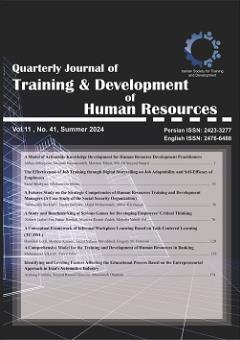A Study and Benchmarking of Serious Games for Developing Employees' Critical Thinking
Subject Areas :
Zohre JaafariFar
1
![]() ,
Bahar Bandali
2
,
Morteza Rezaeizadeh
3
,
Bahar Bandali
2
,
Morteza Rezaeizadeh
3
![]() ,
مجتبی وحیدی اصل
4
,
مجتبی وحیدی اصل
4
![]()
1 - PhD student of Higher Education, Faculty of Educational Sciences and Psychology, Shahid Beheshti University, Tehran, Iran.
2 - Assistant Professor, Department of Educational Sciences, Faculty of Educational Sciences and Psychology, Shahid Beheshti University, Tehran, Iran.
3 - دانشگاه شهید بهشتی
4 - Assistant Professor, Department of Software and Information Systems, Faculty of Engineering and Computer Science, Shahid Beheshti University, Tehran, Iran.
Keywords: Critical thinking, serious games, benchmarking, training and development of human resources,
Abstract :
The growth and sustainability of organizations in competitive environments depend on their ability to cultivate employees with critical thinking; that is, individuals who can bridge the gap between knowledge and commerce, comprehend challenging situations, and are prepared to confront them practically. Fostering this readiness in employees necessitates the adoption of innovative methods. Advanced learning technologies, such as serious games, have opened up new avenues for developing critical thinking competencies. Some serious games have been designed specifically to cultivate critical thinking. By studying and benchmarking these games as a systematic tool, their success in achieving this aim can be evaluated.
This research was conducted with the objective of studying and benchmarking serious games in the context of critical thinking based on Facione's Critical Thinking (CT) model, which comprises six components: Interpretation, analysis, evaluation, inference, explanation, and self-regulation. According to the findings, the components including interpretation, analysis, evaluation, and inference are actively addressed in all the games examined. Meanwhile, the explanation and self-regulation components have received less attention in many of the games. This observation suggests that none of the serious games investigated in this study fully and effectively enhance CT, as their attention to the elements and processes of critical thinking has been incomplete. This shortcoming may be attributed to the neglect of critical thinking models and theories, as well as the lack of involvement of subject-matter experts in the game design and development process. The research findings have been discussed and analyzed using Evelin and Korthagen’s Core Reflection Model.
